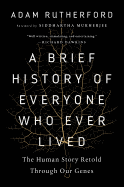
As the most dominant species on Earth, humans have understood their past through storytelling and, more recently, biology, anthropology and other disciplines. In A Brief History of Everyone Who Ever Lived, geneticist and BBC science contributor Adam Rutherford illustrates that genomics--the study of the DNA in our genes--reexamines our history, upending commonly held beliefs about who we are and what the future holds for us.
Rutherford begins 100,000 years ago with the "evolutionary shrub of humankind" and the origin of Homo sapiens--modern humans--tracing their migration out of Africa and intermingling with the now extinct Neanderthals and Denisovans. Along the way, Rutherford identifies whether DNA can explain commonly held beliefs and assumptions, from the profound (who were the first Americans?) to the less momentous (are redheads going extinct?). Rutherford also tackles thorny contemporary issues, including race ("genetically, two black people are more likely to be more different to each other than a black person and a white person") and whether "bad" genes can be responsible for a person's violent behavior.
While genomics is both thrillingly new and exceedingly complicated, Rutherford manages to reveal fresh (and controversial) assessments of human history and dispel long-held beliefs with clarity, enthusiasm and humor. Fans of popular science writers such as Mary Roach will be delighted by amusing footnotes throughout. And with DNA testing widely available, readers will be swabbing their cheeks to find out how their genes tell their story. --Frank Brasile, librarian

